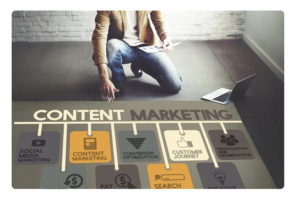 Published Tue Oct 15
Published Tue Oct 15
Content is the past, present, and the future of marketing. It is arguably the most versatile weapon in the digital marketer’s arsenal today. It is not constrained by subject or format, and it can impact any and every stage of the sales funnel. However, its versatility can also prove to be a pitfall for marketers. Hence, the need for an efficient and effective content marketing strategy.
What is Content Marketing?
Content marketing as a buzzword is a relatively new term. We have all heard it – ‘Content is King’. ‘Content is everything’. We’ve heard it far too much, in fact. So what does it actually mean? Why should you or anyone bother about it at all? Joe Pulizzi at the Content Marketing Institute defines content marketing as:
“The technique of creating and distributing valuable and relevant content to attract, acquire, and engage a clearly defined target audience – with the objective of driving profitable customer action.”
The Different Types of Content
In order to market content effectively, it is important to first understand content itself. In the world of marketing, content is any information directed towards an audience – generally for the purpose of generating sales. The common, contemporary types of content include:
- Articles and Blog Posts
- eBooks
- White Papers
- Newsletters
- Press Releases
- Infographics
- Case Studies
- Photos
- Videos
- Mobile Apps
- Guides and Tutorials
- Product Reviews and Descriptions
The Characteristics of Great Content
For content marketing to be effective, the content you produce should be:
- Attractive: Why do people click on one link and ignore the other? Hundreds of thousands of content pieces are uploaded to the internet every single day, and only a handful generate the desired amount of traffic. If you fail to stand out immediately – if your audience doesn’t notice you right away – because you didn’t use an attractive title, then you will be lost to obscurity.
- Engaging: You don’t have to solve the mysteries of the universe. You do, however, need to engage your audience, and hold onto their attention. Most people don’t read beyond the first few sentences of a blog post. You need to make your audience want to read what you write. Get them to care, and they’ll hang onto your every word.
- Valuable: Give your readers a stake in the content you produce. You have to promise value, and then deliver on that promise. Offer information, news, and deals which are of immediate benefit to your audience. Valuable content markets itself. Your readers will distribute it to their peers and networks if only you meet their expectations.
- Relevant: The value of a thing, of anything and all things, is both fickle and subjective. You need to identify the most current needs and preferences of your target audience, and create your content accordingly. Provide knowledge, answers, and solutions the reader wants but also be honest and accurate.
- Efficient: People’s attention spans are getting shorter by the day. The to-do lists only become longer. If your content isn’t easy to find, it won’t be found, period. So you use the most convenient platforms and the most appropriate formats for the content you create. Use the right blend of text, design, images, and videos.
- Actionable: The purpose of content marketing, at the end of the day, is to generate sales and revenue. If your audience doesn’t take the desired action after your blog post or watching your video, then your content has failed its prime objective. Your content should convince without insisting or even disturbing the reader. Use subtle and compelling calls to action.

Content Marketing vs Traditional Advertising
The advantages content marketing enjoys over traditional advertising are many and varied. Most importantly perhaps, content marketing provides information that your target audience actually wants, with their permission. Traditional advertising, on the other hand, interrupts with large billboards and annoying television and radio ads which no one ever really wants to see.
The Benefits of Content Marketing
- Educates customers, leading them to purchase your services and/or products. Great content does this in a subtle, organic manner by making them realize their needs or even creating a need where there is none.
- Provides target audiences with value, so they voluntarily spend hours remaining engaged with your content.
- Develops a reciprocity with your customers. The more free and valuable content you offer to your audience, the more they spend time with it, the more your customers will eventually want to give back through purchases of your goods and services.
- Attracts your target audience for free. Well-written, strategic content can give you a lifelong return on investment, and save you the cost of pay-per-clicks and paid ads.
- Increases traffic for your website organically through a variety of sources, such as blog posts, infographics, eBooks, newsletters, podcasts, and videos.
- Brings your brand and your message to the most relevant, targeted audience, helping you increase your prospect-to-customer conversion rate. A larger audience means more people know about you, yes but is utterly useless if no one is buying what you have to sell.
How to Use Content Marketing Effectively
The single most effective method you can employ for content marketing success is to give your target audience exactly what they want. Create and deliver content for their benefit, and everything else will follow. It doesn’t mean you can’t promote your own products and services. You can, 1 out of 10 times, talk wholeheartedly about your brand, your product, your business.
So create a customer-centric content marketing strategy, plan attractive, engaging, and valuable content, and you will soon be flooded with traffic, leads, sales, and loyal customers
#ContentMarketing #DigitalMarketing #MarketingStrategy #SEO #ContentCreation #SocialMediaMarketing #BrandStorytelling #MarketingTips #CreativeMarketing #MarketingTrends #InboundMarketing #ContentStrategy #ContentIsKing #ContentCreators #OnlineMarketing
Return to Main Blog Page >






